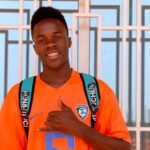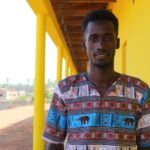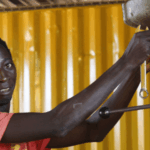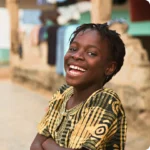I first met Vladimir while he stood outside the English classroom, waiting for his class to start. Vladimir always arrives early to class. Transportation can be tricky in Guinea-Bissau, so he always makes sure to give himself plenty of time in case the taxi or Toka Toka he uses to get to class ends up with a flat. In a country where only 10% of all roads are paved, broken axles and flat tires are one of the few things Guinea-Bissau has a surplus of. Broken-down vehicles line the eroded red dirt streets, monuments to the country’s unforgiving conditions.For Vladimir, this way of life is nothing new. Like all other Bissau Guineans, he is used to being at the mercy of crippling infrastructure and underdeveloped systems.
For Vladimir, this way of life is nothing new. Like all other Bissau Guineans, he is used to being at the mercy of crippling infrastructure and underdeveloped systems.

Vladimir made it all the way to 7th grade in the public education system in Guinea-Bissau before he had to drop out for financial reasons. Making it that far was an achievement. The average Guinean only makes it to 6th.
Widespread poverty means children often begin working at a young age to help support their families. It is common to see children selling bags of water on street corners or mixing dirt to make sunbaked bricks during the hours they would typically be in school. Those who do stay in school often face crumbling infrastructure and months-long school closures from teacher strikes. In most villages, “schools” are typically no more than a thatched wall with wooden benches (not the ideal setting for a country that receives torrential rains daily during the wet season). With conditions like these, it’s no surprise that over half of the country is illiterate.
In 2019, Vladimir attempted to restart his education. He enrolled at a local school but once again, had to stop due to finances. A few years later, he was able to get a job as a server and decided to enroll at the WAVS school in Bissau in the Spring of 2022. Vladimir knows that being able to speak English can help open the door for other job opportunities.
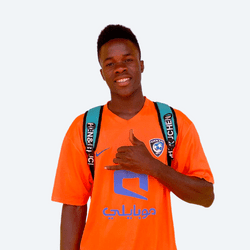
“I am studying so that I can have more opportunities and plans for the future.”
Vladimir, WAVS English Student
I only spoke with Vladimir for a minute or two before he went into class, but his actions are a testament to his eagerness to learn. He prefers to wait in the African heat for half an hour rather than risk missing even a minute of class. He sits in class attentive, carefully copying down words the teacher writes on the whiteboard, biting his lip in concentration. He practiced the English greetings he learned in class with me, beaming from ear to ear when I understood him, and responded accordingly. Every word the teacher says, he repeats under his breath over and over again.
Access to opportunity isn’t just something people in Guinea-Bissau hope for, it’s something they crave. And unfortunately, most schools in the country over-promise and under-deliver.
When I asked one student about her favorite part of the WAVS school she said, “the teacher shows up to class”. What’s considered the bare minimum in most Western countries is something that exceeds expectations in Guinea-Bissau.
Generous donors help fund the WAVS schools in Guinea-Bissau, which keeps tuition affordable for students and helps fill it with high-quality materials. Each WAVS school has a solar panel system that provides electricity to the school, making it unaffected by the frequent power outages that plague the country. The computers in the IT classroom were imported from the US and guarantee that each student has their own computer to learn on while in class. Even the buildings of the WAVS schools themselves are built to a high standard to ensure they’ll withstand the intense African sun and monsoon rains.
This is Vladmir’s third time attempting to learn English. This time – he’s confident he will be successful.

